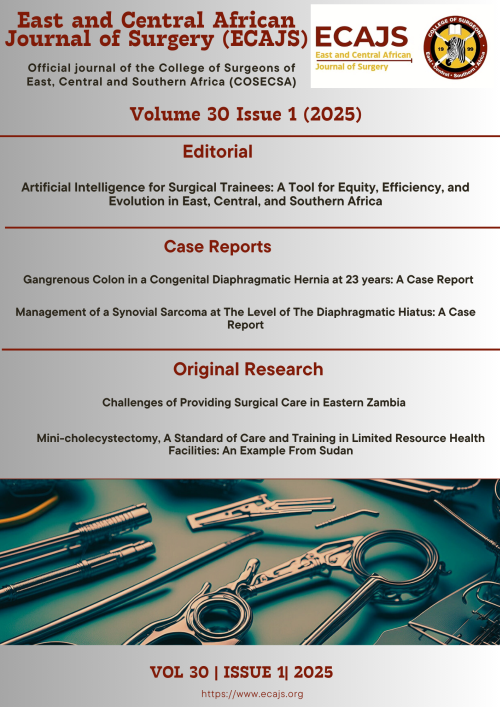Main Article Content
Mini-cholecystectomy, A Standard of Care and Training in Limited Resource Health Facilities: An Example From Sudan
Abstract
Background
Gallstone disease is a common surgical condition, particularly in low- and middle-income countries (LMICs) where access to laparoscopic cholecystectomy (LC) may be limited by cost and equipment availability. Mini-cholecystectomy (MC) offers a viable alternative for gallstone management in similar settings. Objectives: This study assessed the safety, efficacy, and educational value of MC performed by consultants and trainee registrars in a resource-limited setting, evaluating clinical outcomes across different operator experience levels.
Methods
A single-blinded, prospective, descriptive, and analytical study was conducted in surgical facilities in Kassala State, Sudan, from January 2018 to December 2021. All patients undergoing MC for gallstone disease during this period were included. Data were collected on demographics, comorbidities, diagnosis, hospital stay, postoperative outcomes, and pain management. Outcomes were compared between consultants and trainee registrars using the chi-square test, with significance set at P < 0.05.
Results
600 patients underwent MC, with consultants performing 58% of procedures. The mean patient age was 43 years, and the male-to-female ratio was 1:4.9. Hospital stay averaged 2.9 days, with registrars performing more surgeries in patients requiring longer stays (P < 0.0001). Postoperative vomiting was more common in registrar cases (P < 0.0001), and registrar patients reported slightly higher pain scores (P < 0.0001). Biliary injury occurred in three cases. Mini-cholecystectomy demonstrated safety and efficacy in the surgical training unit, with a low biliary injury rate (0.5%) and manageable postoperative pain (mean score of 5.4). It also proved a valuable training standard, as registrars performed 42% of procedures with acceptable outcomes.
Conclusions
Mini-cholecystectomy is a safe, effective, and accessible alternative to LC in LMICs. It also serves as a valuable training tool for surgical registrars. This study supports the expanded use of MC in resource-limited settings to improve access to gallstone management while providing effective training for surgical residents.







